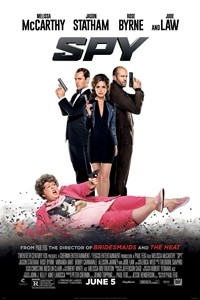 Spy
Spy
Starring Melissa McCarthy, Rose Byrne, Jason Statham, Jude Law, Allison Janney, and Miranda Hart
Directed by Paul Feig
Rated R
Run Time: 120 minutes
Genre: Comedy/Action
Opens June 5th
By Eric Forthun of Cinematic Shadows
Melissa McCarthy continues to prove that, when given ripe comedic material, she is one of the funniest actresses on the planet. After some misfires like Identity Thief and the thoroughly unpleasant Tammy, she re-teams with Paul Feig for Spy, their third collaboration following their previous endeavors Bridesmaids and The Heat. Feig's script is an emphatic statement of comedic authority, proving that his sense of comic timing is relatively flawless, particularly in making jokes after a scene already feels like it has run its course. That's a talent that other writers often attempt to emulate, instead bogging down their films with unnecessary improvisations or quips that fall flat. Feig does the exact opposite, riffing on the well-worn spy genre and infusing it with his own dash of feminine star power, using McCarthy, Rose Byrne (great as ever), and relative newcomer Miranda Hart. Together, they create a film that defies the norms of the action genre and makes a mockery of its masculinity, while simultaneously paying homage to their bloated plots and double-edged characters.
The film follows Susan Cooper (Melissa McCarthy), a desk-bound CIA analyst that guides her field agent, Bradley Fine (Jude Law), one of the agency's top men. She's been working with the agency for ten years, mostly content with her work as one of the finest technological minds in the company. When Fine disappears, though, and a conspiracy for the sale of a nuclear bomb to terrorist groups emerges, Cooper is chosen as a candidate to help save the world due to her unrecognizable self. CIA head Elaine Crocker (Allison Janney) has seen Cooper's footage from the academy and knows that she is one of the finest agents they've ever had. Because of the built-in misogyny in the workplace and the mentality that a woman could not do the work of an active agent, Cooper decided to delegate herself to desk work. Now is her time to shine, and her friend Nancy (Miranda Hart) is proud of her accomplishment, even if she is still stuck at a desk. Cooper is joined in the field, unwillingly, by smarmy, ridiculously masculine agent Rick Ford (Jason Statham), who can help her catch Rayna Boyanov (Rose Byrne), the woman behind the transactions leading to the bomb.
A lot happens in Spy, but the convoluted plot is intentionally meant to simultaneously confuse and thrill. In the film's opening moments, Feig establishes the narrative as a satire of the spy film, with Fine acting as a complete buffoon who needs the help of his "secretary" to get things done. In a summer fueled by female breakthroughs like Elizabeth Banks directing Pitch Perfect 2 and Charlize Theron owning the seemingly testosterone-fueled Mad Max: Fury Road, it still feels refreshing to see women getting the attention they deserve in comedies that decidedly hone the craft and make men secondary to the more engaging and realistic women. McCarthy is phenomenal, having her character form into a full-on spy that talks trash like no other; her motor is filthy and relentless, particularly in a scene where she makes a grown man cry because she points out his incompetence. Feig has a brilliant comedic touch at the end of that particular scene that makes it a hoot. Supporting actors like Statham and Byrne surprise with their acerbic lines and demeanors. Everyone is, quite simply, perfectly cast.
The story admittedly strays as its characters backstab each other countless times and twists seemingly come out of nowhere. But we know enough about these characters and their intentionally formed archetypes that when the twists emerge, they feel authentic to the types of characters that they are. While that may not make a lot of sense in writing, it will on screen. The subtlety to the film's power derives from the way it treats the leading ladies. Feig ensures that the film does not craft its women in the typical fantasy limelight, ensuring that no nudity is used to detract from their comedic talents or the narrative. Nor are there any particularly racist or sexist jokes, which may sound like a thing that all movies should avoid, but you'd be surprised with the types of sequels and mainstream entries this summer that have found those amusing. Nonetheless, the film contextualizes its jokes and derives them from the characters. Jokes do not pop out of nowhere or fall flat. They're either slapstick or character-driven. Feig's an immensely talented writer-director and him and McCarthy simply own the film, proving to be an apt comic duo. They make Spy not only the year's best comedy so far, but one of the year's best films.









